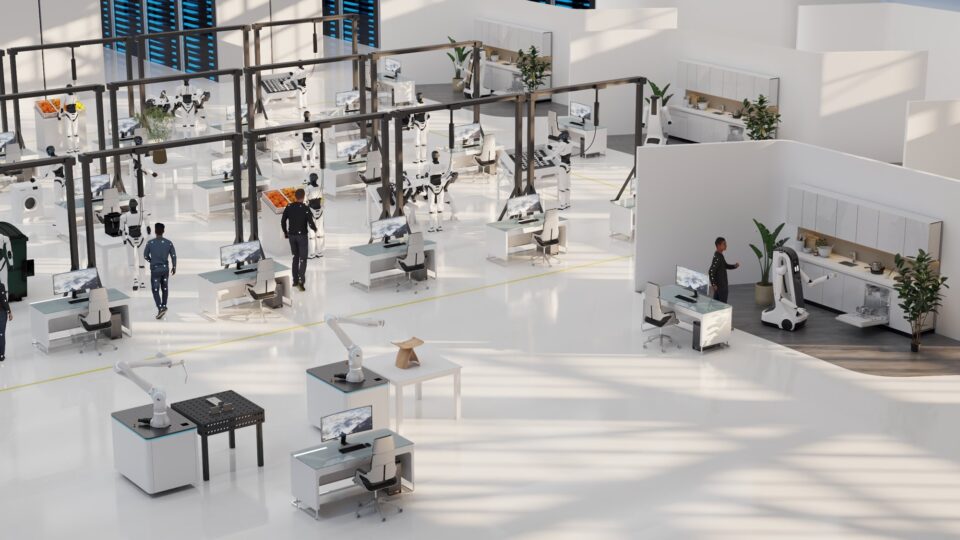Industrial AI isn’t slowing down. Germany is ready.
Following London Tech Week and GTC Paris at VivaTech, NVIDIA founder and CEO Jensen Huang’s European tour continued with a stop in Germany to discuss with Chancellor Friedrich Merz new partnerships poised to bring breakthrough innovations on the world’s first industrial AI cloud.
This AI factory, to be located in Germany and operated by Deutsche Telekom, will enable Europe’s industrial leaders to accelerate manufacturing applications including design, engineering, simulation, digital twins and robotics.
“In the era of AI, every manufacturer needs two factories: one for making things, and one for creating the intelligence that powers them,” said Jensen Huang, founder and CEO of NVIDIA. “By building Europe’s first industrial AI infrastructure, we’re enabling the region’s leading industrial companies to advance simulation-first, AI-driven manufacturing.”
“Europe’s technological future needs a sprint, not a stroll,” said Timotheus Höttges, CEO of Deutsche Telekom AG. “We must seize the opportunities of artificial intelligence now, revolutionize our industry and secure a leading position in the global technology competition. Our economic success depends on quick decisions and collaborative innovations.”
This AI infrastructure — Germany’s single largest AI deployment — is an important leap for the nation in establishing its own sovereign AI infrastructure and providing a launchpad to accelerate AI development and adoption across industries. In its first phase, it’ll feature 10,000 NVIDIA Blackwell GPUs — spanning NVIDIA DGX GB200 systems and NVIDIA RTX PRO Servers — as well as NVIDIA networking and AI software.

NEURA Robotics, a Germany-based global pioneer in physical AI and cognitive robotics, will use the computing resources to power its state-of-the-art training centers for cognitive robots — a tangible example of how physical AI can evolve through powerful, connected infrastructure.
At this work’s core is the Neuraverse, a seamlessly networked robot ecosystem that allows robots to learn from each other across a wide range of industrial and domestic applications. This platform creates an app-store-like hub for robotic intelligence — for tasks like welding and ironing — enabling continuous development and deployment of robotic skills in real-world environments.
“Physical AI is the electricity of the future — it will power every machine on the planet,” said David Reger, founder and CEO of NEURA Robotics. “Through this initiative, we’re helping build the sovereign infrastructure Europe needs to lead in intelligent robotics and stay in control of its future.”
Critical to Germany’s competitiveness is AI technology development, including the expansion of data center capacity, according to a Deloitte study. This is strategically important because demand for data center capacity is expected to triple over the next five years to 5 gigawatts.
Driving Germany’s Industrial Ecosystem
Deutsche Telekom will operate the AI factory and provide AI cloud computing resources to Europe’s industrial ecosystem.
Customers will be able to run NVIDIA CUDA-X libraries, as well as NVIDIA RTX- and Omniverse-accelerated workloads from leading software providers such as Siemens, Ansys, Cadence and Rescale.
Many more stand to benefit. From the country’s robust small- and medium-sized businesses, known as the Mittelstand, to academia, research and major enterprises — the AI factory offers strategic technology leaps.
A Speedboat Toward AI Gigafactories
The industrial AI cloud will accelerate AI development and adoption from European manufacturers, driving simulation-first, AI-driven manufacturing practices and helping prepare for the country’s transition to AI gigafactories, the next step in Germany’s sovereign AI infrastructure journey.
The AI gigafactory initiative is a 100,000 GPU-powered program backed by the European Union, Germany and partners.
Poised to go online in 2027, it’ll provide state-of-the-art AI infrastructure that gives enterprises, startups, researchers and universities access to accelerated computing through the establishment and expansion of high-performance computing centers.
As of March, there are about 900 Germany-based members of the NVIDIA Inception program for cutting-edge startups, all of which will be eligible to access the AI resources.
NVIDIA offers learning courses through its Deep Learning Institute to promote education and certification in AI across the globe, and those resources are broadly available across Germany’s computing ecosystem to offer upskilling opportunities.
Additional European telcos are building AI infrastructure for regional enterprises to build and deploy agentic AI applications.
Learn more about the latest AI advancements by watching Huang’s GTC Paris keynote in replay.
